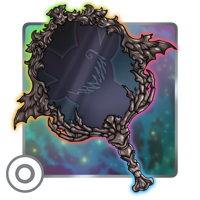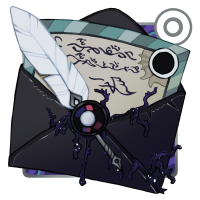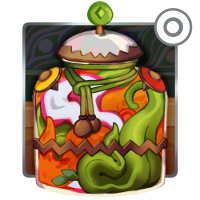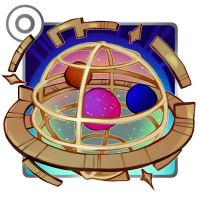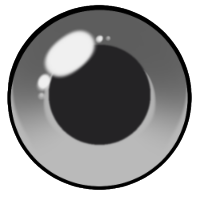
Touched
(Touched)
Touched (Touched)
Click to search ML for trait[Can be used to add 1 Touched trait to a CCCat]
- This can only be used on the design or MYO slot it is attached to, and cannot be transferred to another design
- You may receive this trait as compensation if a design has a trait that is downgraded in rarity
- Please submit a Design Approval to use these traits. All traits added must be depicted in the masterlist image
- Designs using touched tickets or slots may be subject to more changes than average when approving designs due to the multitude of the traits available
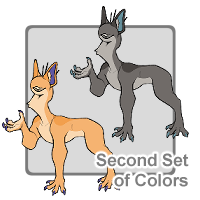
Second Set of Colors
(Touched)
Second Set of Colors (Touched)
Click to search ML for trait[Coat that can completely change all of its colors -- NOT markings]
- All markings and colors can change. Includes claws, crowns, and teeth
- Creates one alternate palette
- Does not change marking shapes
- Does not affect eye and tongue

Can be applied by:
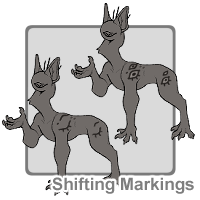
Shifting Markings
(Touched)
Shifting Markings (CCCats) (Touched)
Click to search ML for trait[Coat that can change its markings/patterns -- NOT colors]
- Coat changes marking shape. Examples are a blinking eye, swirls that spin, flickering flames, etc
- Must remain visually and aesthetically similar
- Transition can be at will, triggered by emotions, or constant. Transition can be smooth frames or a fade from one to another
- Does not change colors
- Markings should not move from their general location
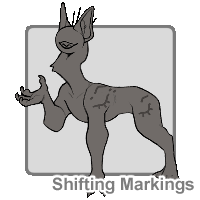
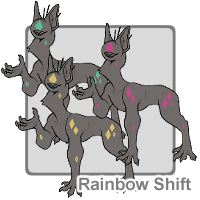
Rainbow Shift
(Touched)
Rainbow Shift (Touched)
Click to search ML for trait[One marking/color can shift through any color of the rainbow]
- One marking type can shift between any color of the rainbow, and be any hue, value, or saturation
- Markings shift to the same color together
- Affects one marking that is the same color
- Cannot make markings dissapear
- Does not effect eyes or tongue

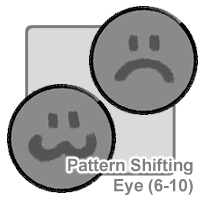
Pattern-Shifting Eye (6-10)
(Touched)
Pattern-Shifting Eye (6-10) (CCCats) (Touched)
Click to search ML for trait[Pattern of a single eye can change]
- Creates 6-10 patterns that the eye can switch between at will.
- Colors should be shared between all eyes if the base color is different OR eyes must share a base color to allow different colors in the pupil.
- Does not require the Patterned Eye as it is automatically included within the trait automatically. It must still follow the above rules.
- This trait does not create separate eyes, only shifting eye patterns
- Eyes must not look like they are multiple different eyes
- This trait cannot be stacked with Secondary Eye Color. Color may change but must follow the rules above.
- CCCATS - A CCCat’s eye must be above 43% saturation and value to be considered a living eye. Please provide a flat and unshaded eye reference when submitting a MYO or Redesign (MYO and Redesign Guide)
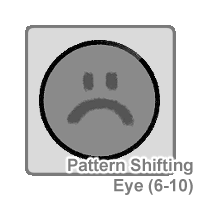
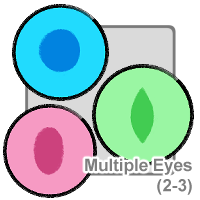
Multiple Eyes (2-3)
(Touched)
Multiple Eyes (2-3) (Touched)
Click to search ML for trait[Adds up to 2 additional eyes apart from their standard eye for a total of 3 eyes]
- Eyes do not need to look visually similar, and are three separate eyes that exist simultaneously.
- All three can be affected by one eye trait [Example: All three can be patterned with x1 use of Patterned eye, and do not need to match at all]
- CCCATS - A CCCat’s eye must be above 43% saturation and value to be considered a living eye. Please provide a flat and unshaded eye reference when submitting a MYO or Redesign (MYO and Redesign Guide)
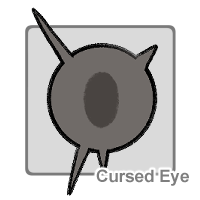
Cursed Eye
(Touched)
Cursed Eye (Touched)
Click to search ML for trait[An eye that inflicts a curse or pain on others or the owner]
- Eye inflicts a curse or pain upon others or the eye's owner. Examples are eyes that cause physical or emotional pain or unease, charms, or mind-altering effects
- Examples should be visual in some way. Examples are spikes or protrusions, light anomalies or projections, texture, or particle effects
- Cannot change the overall shape of the eye, and the eye base must remain round
- CCCATS - A CCCat’s eye must be above 43% saturation and value to be considered a living eye. Please provide a flat and unshaded eye reference when submitting a MYO or Redesign (MYO and Redesign Guide)
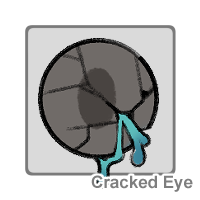
Cracked Eye
(Touched)
Cracked Eye (CCCats) (Touched)
Click to search ML for trait[An eye that is cracked, allowing essence to escape]
- Essence leaks from the eye in the form of dripping substance. This substance can be affected by eye sheen traits such as Metallic, Opalescent, Sparkling, or Glowing Eyes, and can be any color
- Essence typically forms the pattern of the eye when unbroken. Essence is considered the core magic/life force of a CCCat
- Pupil and pattern should still be intact
- Pupil can be missing certain pieces, but should remain in the round shape of an eye
- CCCATS - A CCCat’s eye must be above 43% saturation and value to be considered a living eye. Please provide a flat and unshaded eye reference when submitting a MYO or Redesign (MYO and Redesign Guide)
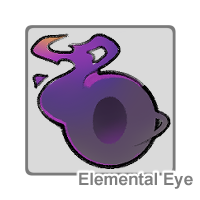
Elemental Eye
(Touched)
Elemental Eye (CCCats) (Touched)
Click to search ML for trait[An eye with features or made up of elemental/magic substances]
- Elements that can affect the eye: Water, Air, Fire, Earth, Ice, Ether, Smoke, Steam, Storm, Magma, Sludge, Electricity, Nature, Light, Space, Blood
- Can be any color, and does not need to follow living color rules
- Should follow standard base eyeball shape, but can have trails of the element coming from the eye
Can be applied by:
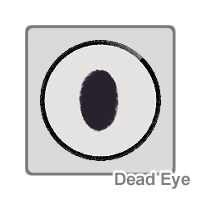
Dead Eye
(Touched)
Dead Eye (Touched)
Click to search ML for trait[Implies reanimation of a CCCat, and is shown through black, white, greyscale, or dull colors in the eye]
- Dead eyes imply the reanimation of a CCCat for whatever reason
- Any eye with any color below Saturation and Value of 43% is considered dead, even if some colors are living
- To have a dead sclera and colored standard-shaped pupil, Dual-Colored Eye is required
- Can be affected by traits that control eye sheen and pattern
- Old-Gen Eye allows for dead eye, but follows different rules.
Can be applied by:
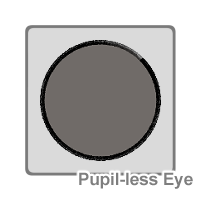
Pupil-Less Eye
(Touched)
Pupil-Less Eye (Touched)
Click to search ML for trait[The eye is solid in color or lacks discernable pupil shape]
- Eye is solid in color or lacks a discernable pupil shape
- Includes eyes that are only gradients, are fuzzy/unclear, or is covered in a single continuous pattern such as a honeycomb
- Affects the entirety of the eye
- CCCATS - A CCCat’s eye must be above 43% saturation and value to be considered a living eye. Please provide a flat and unshaded eye reference when submitting a MYO or Redesign (MYO and Redesign Guide)
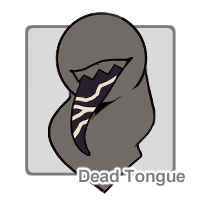
Dead Tongue
(Touched)
Dead Tongue (Touched)
Click to search ML for trait[Implies reanimation of a CCCat, and is shown through black, white, greyscale, or dull colors in the tongue]
- Dead tongue implies the reanimation of a CCCat for whatever reason
- Any tongue with any color below Saturation and Value of 43% is considered dead, even if some colors are living
- Effects the entirety of the tongue or part of the tongue
- Can be effected by traits that control tongue sheen and pattern
- Old-Gen Tongue allows for dead tongue, but follows different rules.
Can be applied by:
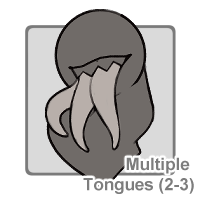
Multiple Tongues (2-3)
(Touched)
Multiple Tongues (2-3) (CCCats) (Touched)
Click to search ML for trait[Adds up to 2 additional tongues apart from their standard tongue for a total of 3]
- Tongues do not need to look visually similar, and are three separate tongues that exist simultaneously
- All three can be affected by one tongue trait [Example: All three can be patterned with x1 use of Patternless tongue, and do not need to match at all]
- If a design has Multiple Mouths, this trait is needed to make the tongues appear visually different from one another.
- CCCATS - A CCCat’s tongue must be above 43% saturation and value to be considered a living tongue. Please provide a flat and unshaded tongue reference when submitting a MYO or Redesign (MYO and Redesign Guide)
Can be applied by:
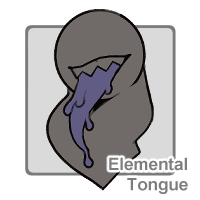
Elemental Tongue
(Touched)
Elemental Tongue (Touched)
Click to search ML for trait[A tongue with features that are elemental or is made entirely of elemental substances]
- Elements that can affect the tongue: Water, Air, Fire, Earth, Ice, Ether, Smoke, Steam, Storm, Magma, Sludge, Electricity, Nature, Light, Space, Blood
- Can be any color, and does not need to follow living color rules
- Should follow standard base tongue shape, but can have trails of the element coming from the tongue
Can be applied by:

Transparent Tongue
(Touched)
Transparent Tongue (Touched)
Click to search ML for trait[Tongue has some blurry transparency]
- Can affect part of or all of the tongue
- Tongue can have markings or be patternless
- Can be any color, and does not need to follow living color rules
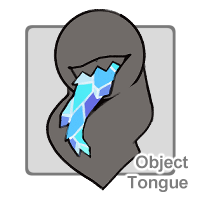
Object Tongue
(Touched)
Object Tongue (Touched)
Click to search ML for trait[Tongue is replaced by an object or has inanimate objects growing on it]
- Entire tongue or part of tongue is replaced by or covered in an object of some kind. Examples are a scarf, yarn, stone, wires, etc
- Should retain standard tongue shape
- Can be any color, and does not need to follow living color rules
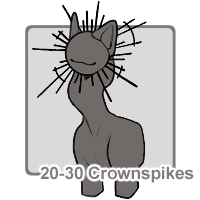
21-30 Crownspikes
(Touched)
21-30 Crownspikes (Touched)
Click to search ML for trait[21-30 crownspikes total]
- Counts for the total crowns across all parts of the body
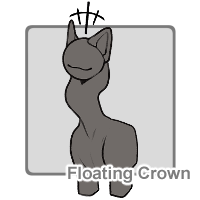
Floating Crown
(Touched)
Floating Crown (Touched)
Click to search ML for trait[Base of the crown is not connected, but rather floats over the CCCat]
- Must have crownspikes that point towards the head or body to indicate that they are crowns
- Should be centralized around the head unless using Crowns Elsewhere on Body
- Can be effected by linked crowns, but there must still be clear crownspikes
- Base of the crown cannot attatch to the head at all
Can be applied by:
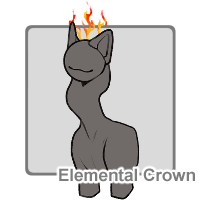
Elemental Crown
(Touched)
Elemental Crown (Touched)
Click to search ML for trait[Crown has elemental features or is made up entirely of elemental substances]
- Elements that can affect the crowns: Water, Air, Fire, Earth, Ice, Ether, Smoke, Steam, Storm, Magma, Sludge, Electricity, Nature, Light, Space, Blood
- Should follow and show a clear crown shape, but can have trails of the element coming from them
- Effected by crown number traits, and must be connected to the body unless using Floating Crown
- Particles such as sparks, small flames, drips, ice shards/snow, and smoke trails can be used on this trait without the corresponding traits
Can be applied by:
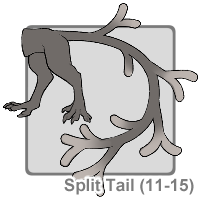
Split Tail (21-40)
(Touched)
Split Tail (21-40) (CCCats) (Touched)
Click to search ML for trait[Tail splits up to 40 times]
- Up to 40 splits
- Traits that affect tail tips may apply to all tail tips present
- Counted by number of splits present in the tail
- Splits can begin at different parts of the tail but cannot be more than half of the tail length
- Splits can merge back together. The split and merged end count as a total of 2 splits
- Counts TOTAL splits across all tails
- Cannot split more than halfway down the tail
